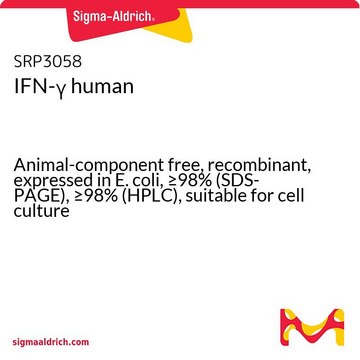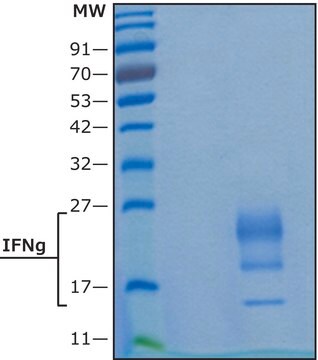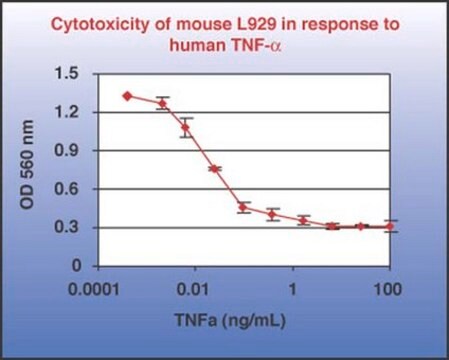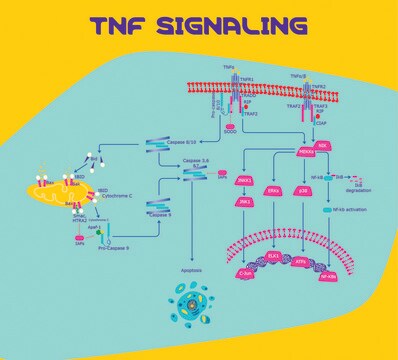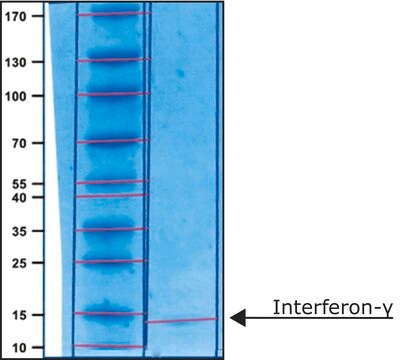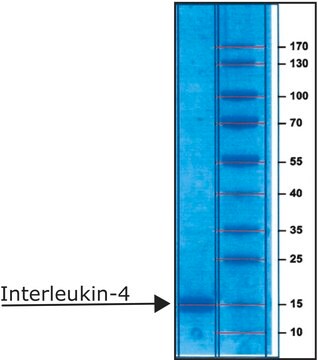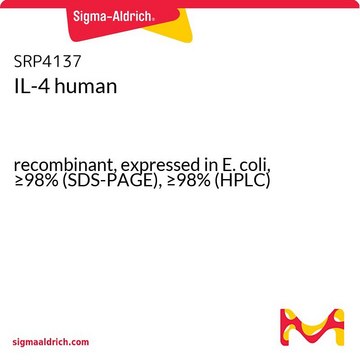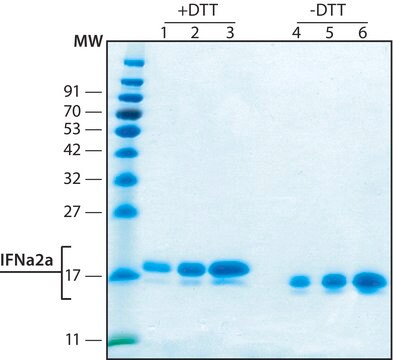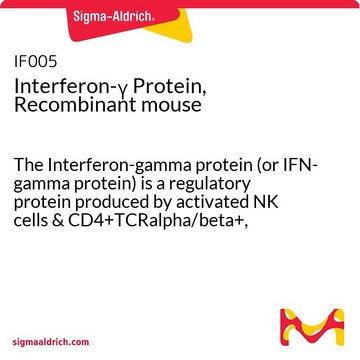GF305
IFN- γ Protein, Human Recombinant Animal Free
The Interferon gamma (or IFN-γ protein) is an acid-labile interferon produced by CD4 & CD8 T lymphocytes as well as activated NK cells. Manufactured using all non-animal reagents.
Synonim(y):
IFN, Interferon Gamma, IFNG, IFN Gamma
Zaloguj sięWyświetlanie cen organizacyjnych i kontraktowych
About This Item
Kod UNSPSC:
12352202
eCl@ss:
32160405
NACRES:
NA.77
Polecane produkty
Poziom jakości
Próba
>98% (SDS-PAGE and HPLC)
zanieczyszczenia
<0.1 μg/mg protein endotoxin (<1EU/μg)
numer dostępu NCBI
numer dostępu UniProt
Warunki transportu
dry ice
Opis ogólny
Interferon gamma (IFN-γ) is an acid-labile interferon produced by CD4 and CD8 T lymphocytes as well as activated NK cells. IFN-γ receptors are present in most immune cells, which respond to IFN-γ signaling by increasing the surface expression of class I MHC proteins. This promotes the presentation of antigen to T-helper (CD4+) cells. IFN-γ signaling in antigen-presenting cells and antigen-recognizing B and T lymphocytes regulate the antigen-specific phases of the immune response. Additionally, IFN-γ stimulates a number of lymphoid cell functions including the anti-microbial and anti-tumor responses of macrophages, NK cells, and neutrophils. Human IFN-γ species-specific and is biologically active only in human and primate cells. Recombinant human IFN-γ is a 16.7 kDa protein containing 143 amino acid residues.
Jakość
Bioactivity assay: Determined by its ability to induce apoptosis in HeLa cells. The expected ED50 for this effect is 5.0-10.0 ng/ml.
Postać fizyczna
Recombinant animal free human IFN- γ is manufactured using all non-animal reagents
Ta strona może zawierać tekst przetłumaczony maszynowo.
Kod klasy składowania
11 - Combustible Solids
Klasa zagrożenia wodnego (WGK)
WGK 1
Certyfikaty analizy (CoA)
Poszukaj Certyfikaty analizy (CoA), wpisując numer partii/serii produktów. Numery serii i partii można znaleźć na etykiecie produktu po słowach „seria” lub „partia”.
Masz już ten produkt?
Dokumenty związane z niedawno zakupionymi produktami zostały zamieszczone w Bibliotece dokumentów.
Klienci oglądali również te produkty
Hong-Lin Luo et al.
Cancer cell international, 21(1), 422-422 (2021-08-12)
Epithelial-mesenchymal transition (EMT) promotes migration, invasion, and metastasis of hepatocellular carcinoma (HCC) cells. The molecular mechanisms behind EMT and metastasis in HCC remain unclear. Microarray analysis was used to identify lncRNAs expression during polarization of U937 macrophages from M2 to
Nasz zespół naukowców ma doświadczenie we wszystkich obszarach badań, w tym w naukach przyrodniczych, materiałoznawstwie, syntezie chemicznej, chromatografii, analityce i wielu innych dziedzinach.
Skontaktuj się z zespołem ds. pomocy technicznej